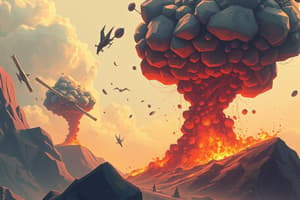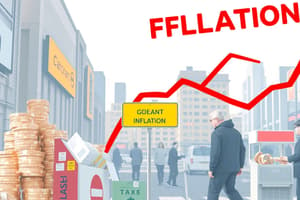Podcast
Questions and Answers
What is the main cause of demand pull inflation?
What is the main cause of demand pull inflation?
- Decrease in demand for goods and services
- Increased spending power and confidence (correct)
- Decrease in consumer confidence
- Lower prices charged by businesses
Which of the following is a factor contributing to cost push inflation?
Which of the following is a factor contributing to cost push inflation?
- Wage increases for workers (correct)
- Reduced energy costs
- Decreased taxes
- Lower resource availability
What do businesses typically do in response to demand pull inflation?
What do businesses typically do in response to demand pull inflation?
- Reduce prices to attract more customers
- Maintain the same prices to stabilize the market
- Increase prices to keep up with rising demand (correct)
- Cut back on production to limit supply
Why might cost push inflation lead to supplier firms passing added expenses onto customers?
Why might cost push inflation lead to supplier firms passing added expenses onto customers?
In an economy experiencing strong economic expansion, what type of inflation is more likely to occur?
In an economy experiencing strong economic expansion, what type of inflation is more likely to occur?
Why is it important for productive economies to anticipate and manage risks associated with fluctuating prices?
Why is it important for productive economies to anticipate and manage risks associated with fluctuating prices?
What is inflation in economics?
What is inflation in economics?
How do government stimulus measures like tax cuts contribute to inflation?
How do government stimulus measures like tax cuts contribute to inflation?
What is one of the causes of inflation related to the labor market?
What is one of the causes of inflation related to the labor market?
How can supply shocks contribute to inflation?
How can supply shocks contribute to inflation?
How can monetary policy contribute to inflation?
How can monetary policy contribute to inflation?
What role do interest rates play in relation to inflation?
What role do interest rates play in relation to inflation?
Flashcards are hidden until you start studying
Study Notes
Inflation
In economics, inflation refers to the general rise in prices over time. It's often described in terms of price level – essentially, how many dollars it takes to buy something today compared to last week, month, year, etc. This is measured by various indices such as Consumer Price Index (CPI) or Producer Price Index (PPI). To understand why this happens, we need to explore its two main aspects: causes of inflation and different types of it.
Causes of Inflation
There are several reasons for inflation. One major factor contributing to higher prices is when people have more money available due to government stimulus measures like tax cuts, which can lead to increased demand for goods and services, causing suppliers to raise their prices accordingly. Another reason is supply shocks - disrupting production processes or natural disasters affecting resources, leading to shortages and thus inflated prices. A third cause could be increasing wages in response to high labor market conditions.
Another significant contributor to inflation is monetary policy. If central banks increase the amount of currency they issue without raising productivity levels, too much money chases after limited goods, resulting in rising prices. Additionally, if interest rates are kept low for prolonged periods, inflation might result because consumers borrow more, spend more, and create more aggregate demand.
Types of Inflation
Demand Pull Inflation
Demand pull inflation occurs when there is strong economic expansion with increasing consumer confidence that leads to increased spending power and subsequent rise in demand for goods and services beyond what producers can supply immediately. As a consequence, businesses begin to charge higher prices so they can keep up with new orders while maintaining or improving profit margins.
Cost Push Inflation
Cost push inflation arises from changes in costs related to producing goods—for example, energy costs, resource availability, taxes, or wage increases may make business operations expensive enough to force supplier firms either into bankruptcy or to pass these added expenses onto customers through raised product prices.
Understanding these dynamics helps us appreciate both the complexity of controlling inflation and also the value of anticipating and managing potential risks associated with fluctuating prices for productive economies where growth depends upon balance between stability and dynamism.
Studying That Suits You
Use AI to generate personalized quizzes and flashcards to suit your learning preferences.




